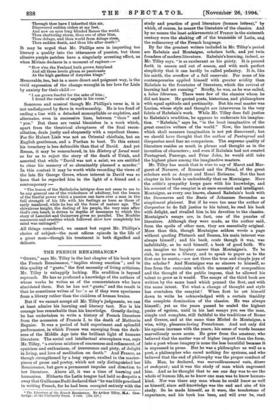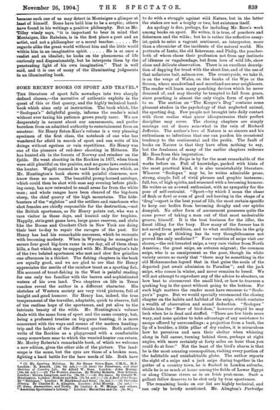" GUSTO," says Mr. Tilley in the last chapter of
his book upon the French Renaissance, " implies strong emotion " ; and in this quality of " gusto," the first necessity of living criticism, Mr. Tilley is unhappily lacking. His erudition is beyond reproach. He has as profound a knowledge of the authors of whose works he writes as of the commentators who have elucidated them. But he has not " gusto," and the result is that he sometimes writes of boe':s as if they were specimens from a library rather than the children of human brains.
But if we cannot accept all Mr. Tilley's judgments, we can at least admire his learning and literary tact. Nor is his courage less remarkable than his knowledge. Greatly daring, he has undertaken to write a history of French literature from the accession of Francis I. to the death of Mathurin Regnier. It was a period of bold experiment and splendid performance, in which France was emerging from the dark- ness of the Middle Age into the brilliant light of humane literature. The social and intellectual atmosphere was, says Mr. Tilley, " a curious mixture of coarseness and refinement, of cynicism and enthusiasm, of irreverence and piety, of delight in living, and love of meditation on death." And France, as though strengthened by a long repose, exulted in the master- pieces of prose and poetry, which not only distinguished her Renaissance, but gave a permanent impulse and direction to her literature. Above all, it was a time of learning and humanism. Hitherto the Latin tongue had held so despotic a sway that Guillaume Bude declared that "he was little practised in writing French, for he had been occupied entirely with the
The Literature of the French Renaissance. By Arthur Tipsy, ISLA, Cam- bridge : at the University Press. 2 vols. [15s, net.)
study and practice of good literature (bonnes lettres)," by which, of course, he meant the literature of the classics. And by no means the least achievements of France in the sixteenth century were the shaking off of the trammels of Latin, and the rediscovery of the French language.
By far the greatest writers included in Mr. Tilley's period are Rabelais and Montaigne, scholars both, and yet twin founders of modern literature. Rabelais's learning, indeed, as Mr. Tilley says, "is as exuberant as his gaiety. It is poured forth in season and out of season, and with such perfect simplicity that it can hardly be called pedantry. It is, like his mirth, the overflow of a full reservoir. For none of his contemporaries applied himself with greater avidity than Rabelais to the fountains of literature, which the revival of learning had set running." Briefly, he was, as he was culled, a heluo librorum. There were few of the classics whom be did not know. He quoted poets, historians, and philosophers with equal aptitude and pertinacity. But his real master was Lucian, whose style and thought are interwoven in the very fabric of Rabelais's work. While Mr. Tilley does full justice to Rabelais's erudition, he appears to underrate his imagina- tion. " Rabelais," says he, " is the least imaginative of the great creative writers of the world." Now, the instrument which shall measure imagination is not yet discovered ; but we should have thought that the author of Pantagruel and Gargantua need fear no comparison. The supreme quality of literature resides as much in phrase and thought as in the invention of characters ; and even if Rabelais had not created Pantagruel, Panurge, and Friar John, he would still take the highest place among the imaginative masters.
Mr. Tilley has much that is wise to say of Marot and Mar- garet of Navarre, of Ronsard and the Pleiad, of the great scholars such as Aniyot and Henri Estienne. But the best chapter in his book is undoubtedly that on Montaigne. Here the critic's sympathy keeps pace with his knowledge, and his account of the essayist is at once succinct and intelligent. Montaigne, as every one knows, classed Rabelais's book with the Decanteron and the Basia of Johannes Secundus as simplement plaisant. But if he were too near the author of Gargantua to do full justice to his talent, he read his book with delight, and rivalled him in his devotion to the classics. Montaigne's essays are, in fact, one of the puzzles of literature. Although they were made, as the author said, from the spoils of other men, they are essentially original. More than this, though Montaigne seldom wrote a page without quoting Plutarch and Seneca, his main interest was always himself ; and his book, cento though it was, was indubitably, as he said himself, a book of good faith. We can imagine no happier career than Montaigne's. To be rich, to possess a library, and to speak to paper as to the first one he meets,—are not these the true and simple joys of the scholar ? And Montaigne was so sincere to himself, so free from the restraints which the necessity of composition and the thought of the public impose, that he allowed his talent to grow as it would. The essays of the third book are written by the same hand which penned the first, and with the same intent. Yet what a change of thought and style has overtaken the essayist When first he set himself down to write he acknowledged with a certain timidity the complete domination of the classics. He was always himself ; yet as the years passed he scaled the highest peaks of egoism, until in his last essays you see the man, simple and complete, still faithful to the traditions of Rome and Greece, and at the same time Michel de Montaigne, a wise, witty, pleasure-loving Frenchman. And not only did his egoism increase with the years; his sense of words became marvellously more acute. He grew from the amateur, who believed that the matter was of higher import than the form, into a poet whose imagery is none the less beautiful because it is expressed in prose. But he was a philosopher as well as a poet, a philosopher who cared nothing for systems, and who believed that the end of philosophy was the proper conduct of life. Man, he declared, was merveilleusement vain, divers et ondoyant ; and it was the study of man which engrossed him. And as he thought that to see one day was to see the whole of human life, so to know one man was to know human- kind. Nor was there any man whom he could know as well as himself, since self-knowledge was the end and aim of his study. So he made himself, as it were, the touchstone of experience, and his book has been, and will ever be, read because each one of us may detect in Montaigne a glimpse at least of himself. Some have held him to be a sceptic ; others have found in his writings a positive philosophy. But as Mr. 'Tilley wisely says, "it is important to bear in mind that Montaigne, like Rabelais, is in the first place a poet and an
artist, and not a philosopher or a moral teacher He regards alike the great world without him and the little world
within him in an imaginative spirit He is at once a 'realist and an idealist; he looks on the phenomena of life -curiously and dispassionately, but he interprets them by the penetrating light of his own imagination?' That is well said, and it is one of many of the illuminating judgments in an illuminating book.
SOME RECENT BOOKS ON SPORT AND TRAVEL.*















































 Previous page
Previous page